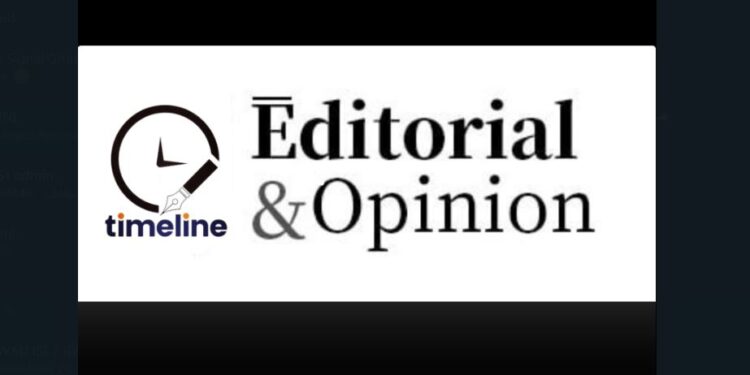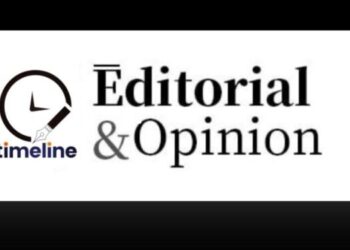(Written By: Abdul Basit Alvi)
The independence of the military is a cornerstone of any nation seeking to preserve a stable political system, protect national security, and uphold democratic governance. While the military’s primary duty is to defend a country’s sovereignty, its relationship with civilian authorities and its broader societal role are equally critical. An independent military—one that operates under the rule of law, is free from political interference, and adheres to professional standards—ensures it remains a reliable institution for both defense and the safeguarding of democratic values.
The military’s independence, in this sense, refers to its ability to perform its duties without undue political influence or interference from powerful individuals or factions within the government.
Moreover, the independence of the military allows military leaders to focus on their primary mission: securing national defense, executing defense strategies, and maintaining operational readiness. A military insulated from political pressures can make decisions based on strategic and security needs, rather than short-term political calculations, leading to a more professional and capable force. In contrast, where political interference is prevalent, decision-making may be clouded by partisan motives, compromising military effectiveness and resource allocation. Military leaders who are free from such constraints are better positioned to prioritize national security and make decisions driven by expertise and operational necessity.
Finally, the independence of the military is crucial for ensuring that military actions align with the rule of law, international law, and human rights standards. A military that operates with autonomy, guided by a professional code of conduct, is more likely to uphold ethical guidelines and avoid actions that could lead to human rights violations. One of the military’s key roles is to defend the nation from external threats. However, the independence of the armed forces is equally crucial for ensuring internal security during times of political crisis. In nations facing political instability, protests, or civil unrest, the military’s ability to remain neutral and adhere to its constitutional duties—rather than becoming embroiled in partisan politics—can help prevent the situation from escalating into violence. When the military is not aligned with political factions, it is better positioned to safeguard national interests and respond to crises in a way that prioritizes the well-being of all citizens. This neutrality helps prevent the militarization of politics, where military force might be used to suppress opposition or further the agenda of a particular political group. An independent military also fosters public trust, ensuring that the armed forces are viewed as protectors of the nation, rather than instruments of political power. When the armed forces are perceived as professional, nonpartisan, and committed to safeguarding the nation, they are more likely to earn the respect and loyalty of the public. This trust is crucial for the military’s effectiveness, particularly in times of national crisis or conflict. Conversely, if the military is seen as being overly influenced by political elites or using its power for partisan purposes, it can erode public confidence in the institution. Public support plays a key role in sustaining military morale and ensuring operational effectiveness.
The military’s independence is also vital for fostering international relations and military diplomacy. A politically neutral, professional armed force is better equipped to participate in international peacekeeping missions, security cooperation, and alliances. Whether engaging in United Nations peacekeeping efforts, joint exercises, or collective defense agreements like NATO, a military that is free from domestic political influence can act as a reliable and stable partner on the world stage. Nations frequently seek military cooperation to strengthen security ties, share intelligence, and exchange resources and expertise. If a country’s military is perceived as politically unstable or partisan, it can undermine international alliances and damage diplomatic relations.
The position of the Army Chief is one of the most critical roles in a nation’s defense and security framework. Whether in peacetime or during conflict, the Army Chief serves as a cornerstone of military leadership, setting the strategic direction for the armed forces and playing a pivotal role in shaping national defense policy. The Army Chief is chiefly responsible for ensuring the military’s operational readiness, overseeing the training, equipping, and deployment of personnel and resources. Their decisions directly influence how a country prepares for and responds to potential threats, both internal and external.
In peacetime, the Army Chief anticipates future security challenges, devises contingency plans, and adapts military strategies to changing geopolitical conditions. In times of conflict, their ability to make swift, decisive decisions is crucial to the success or failure of military operations. The Army Chief also works closely with political leaders, offering expert advice on defense policy and contributing to the development of long-term security strategies. Their expertise guides critical decisions on defense budgeting, resource allocation, and the acquisition of modern military technology.
This role is vital for ensuring the nation’s preparedness to face a range of defense challenges, from conventional warfare to counterterrorism and peacekeeping operations. As the leader of the military, the Army Chief is not only a strategist but also a symbol of leadership and discipline. Military personnel look to the Army Chief for direction, motivation, and morale, especially during periods of crisis or uncertainty. A strong and decisive leader can boost the confidence of the armed forces, unifying them around a common mission and reinforcing a sense of purpose. An effective Army Chief leads by example, embodying the highest standards of integrity, professionalism, and courage. Their leadership style has a profound impact on troop morale, shaping how soldiers approach their duties and overcome challenges. In critical situations, the confidence instilled by the Army Chief can be the deciding factor between success and failure. In addition to military leadership, the Army Chief is responsible for the well-being of military personnel, advocating for their needs and ensuring that their sacrifices are acknowledged. This includes addressing issues like mental health support, family assistance, and the overall welfare of the force, all of which contribute to the military’s resilience.
While the Army Chief’s primary role is as a military leader, they also play a vital part in maintaining strong civil-military relations. As the key link between the armed forces and the civilian government, the Army Chief ensures that military power is used in line with national interests and democratic principles. This relationship is crucial for upholding civilian oversight of the military, ensuring that the armed forces remain apolitical and focused on serving the nation, rather than advancing the interests of any individual or political party. In many countries, the Army Chief also serves as a key advisor to the head of state or government, providing military insights on national security matters and international relations. Their ability to navigate the balance between military objectives and civilian governance is crucial for preventing the misuse of military power and safeguarding the stability of democratic institutions. During times of national crisis—whether caused by natural disasters, political instability, or armed conflict—the Army Chief often takes a leading role in crisis management. Their capacity to coordinate military and humanitarian efforts, mobilize resources, and manage complex operations can significantly influence the effectiveness of the national response. In certain situations, the Army Chief may be responsible for overseeing peacekeeping missions or disaster relief efforts, demonstrating the multifaceted nature of the role.
In periods of tension with neighboring countries or during international conflicts, the decisions made by the Army Chief can shape the course of events. Their strategic insight and ability to stay composed under pressure ensure that the military is prepared to act swiftly and efficiently when required. The Army Chief is not only a national leader but also an important figure in international military relations. In today’s interconnected world, military cooperation, intelligence sharing, and joint training are essential for global security. The Army Chief represents the country’s military interests abroad, engaging with counterparts from other nations, participating in defense alliances, and contributing to multinational peacekeeping efforts. They may also advocate for the nation’s defense priorities in global forums like the United Nations or NATO, enhancing their country’s international standing and helping to prevent conflicts through strategic partnerships and alliances.
Another critical responsibility of the Army Chief is overseeing the long-term development and modernization of the armed forces. This includes evaluating technological advancements, forecasting future defense needs, and ensuring that the military remains capable of addressing emerging threats. Whether it’s advancing cybersecurity capabilities, acquiring state-of-the-art weaponry, or adapting to new forms of warfare—such as hybrid or cyber warfare—the Army Chief plays a vital role in shaping the future of the nation’s defense forces. By driving strategic innovation and anticipating future challenges, the Army Chief ensures that the military is not only prepared for current threats but is also future-proofed for the evolving nature of warfare.
The tenure of the Army Chief is a crucial factor in shaping the professionalism, operational readiness, and overall relationship between the military and civilian leadership. In many countries, the duration of an individual’s tenure as Army Chief can have significant implications for both the military and the broader political landscape.
One of the main arguments in favor of a longer tenure for the Army Chief is that it offers greater stability and consistency in military leadership. A prolonged term allows the Army Chief to implement long-term strategic initiatives, manage complex defense reforms, and ensure the military operates smoothly without the disruptions that frequent leadership transitions can cause. A prolonged tenure for an army chief can be particularly critical during times of national security challenges or when the military is engaged in long-term operational commitments. In countries dealing with external threats or internal instability, having continuity at the top of the military leadership helps ensure defense strategies remain consistent and that military operations proceed without disruption. A longer tenure also enables the army chief to cultivate stronger relationships with political leaders, international allies, and military personnel, promoting trust and more effective collaboration.
In addition, extended leadership can contribute to strengthening military institutions. It provides the army chief with the opportunity to address structural issues, implement necessary reforms, and enhance the professionalism of the armed forces. Military reforms—whether in modernization, training, or operational readiness—often require sustained leadership to achieve long-term goals. An extended tenure allows for more comprehensive planning and the ability to follow through on these initiatives. Furthermore, longer terms provide the army chief with the time and authority to oversee the professional development of the officer corps, resulting in a more competent and skilled leadership team that is better equipped to address future challenges.
The length of an army chief’s tenure plays a key role in balancing military leadership, civilian oversight, and national defense. While extended tenures can sometimes be viewed as a threat to democratic governance and civilian control, there are cases where such extensions have positively impacted the independence and professionalism of the armed forces. In these instances, longer terms have allowed the military to stay focused on its primary mission—defending the nation—while maintaining political neutrality and upholding democratic institutions. With the right safeguards in place, extending the tenure of the army chief can enhance national security and contribute to democratic stability.
One notable example is General Valery Gerasimov, who has served as the Chief of the General Staff of the Armed Forces of the Russian Federation since 2012. His long tenure has positively influenced the Russian military’s ability to implement long-term strategies, improve readiness, and maintain a high level of professionalism. Under his leadership, the Russian military has modernized its doctrines, shifting focus to hybrid warfare, cyber capabilities, and rapid-response forces. The continuity in leadership has allowed these complex reforms to be carried out smoothly, avoiding the disruption that might arise from frequent changes in command. Moreover, this extended leadership has enabled Gerasimov to build strong institutional relationships that facilitate better coordination across different branches of the military, ensuring that Russia’s defense forces are well-prepared for a range of potential conflicts. A longer tenure for the army chief also enables the military to establish and pursue long-term defense objectives, especially when confronting emerging and evolving security threats. This strategic flexibility is essential for countries with global ambitions or those navigating complex geopolitical landscapes. For Russia, maintaining continuity in military leadership has been pivotal in shaping its defense strategy in regions like Eastern Europe, the Middle East, and beyond.
Turkey offers a unique case study in the relationship between the army chief’s tenure and military independence, particularly considering the country’s history of military coups and the significant role the military has historically played in politics. While the Turkish military has traditionally been a dominant force in political affairs, recent reforms have sought to curtail its political influence and reinforce civilian oversight. Despite these changes, the extended terms of army chiefs have played a key role in preserving the professionalism and operational effectiveness of the military. Historically, long-serving army chiefs, such as General İlker Başbuğ (2008–2010), have played a key role in stabilizing Turkey’s defense institutions during periods of political and economic instability. Extended leadership tenures allowed these commanders to focus on modernizing Turkey’s military and upholding the professionalism of the officer corps, even amid significant political challenges. A longer tenure also enabled the army chief to retain control over the military’s internal affairs, ensuring the force remained apolitical and centered on its core mission—national defense—while shielding it from undue political influence by civilian governments or political factions.
In Turkey, where the military has traditionally wielded considerable political power, the extension of army chiefs’ tenures in recent years has helped distance the armed forces from direct political involvement. While civilian control is now more firmly established, the military’s independence remains vital to ensuring that defense policy is driven by national security needs rather than short-term political considerations. Extended tenures for army chiefs in Turkey have enabled the military to resist efforts to politicize the armed forces, allowing it to maintain its focus on its constitutional role of safeguarding the nation’s security.
Similarly, Singapore—known for its highly professional and disciplined military—has experienced the benefits of longer tenures for its army chiefs. The Singapore Armed Forces (SAF) is often regarded as one of the most modern and capable in Asia, with the stability provided by long-serving army chiefs playing a significant role in its success. The extended tenure of General Ng Chee Meng (2013–2016) allowed the SAF to implement modernization programs, enhance training initiatives, and build stronger regional defense partnerships. This continuity in leadership has ensured that defense decisions are based on strategic, long-term needs, rather than short-term political considerations. While Singapore’s political leadership is closely involved in military affairs, the independence of the military is respected, with long-serving army chiefs overseeing the force’s professionalization and modernization.
South Korea’s security environment, shaped by its proximity to North Korea, underscores the importance of stability in military leadership. The extended tenure of figures such as General Ahn Byung-seok (2014–2016) in the Republic of Korea Army has provided consistent leadership during a period of heightened tensions on the Korean Peninsula. A longer tenure for the army chief has allowed for greater continuity in defense planning, ensuring the successful implementation of South Korea’s military strategy. In such a volatile geopolitical context, ensuring that the army chief can oversee long-term defense initiatives—such as missile defense systems, joint military exercises with allies like the United States, and modernization efforts—is crucial for maintaining the South Korean military’s operational readiness. Although South Korea has faced periods of political instability, the extended tenures of army chiefs have played a crucial role in ensuring the military stays focused on its core defense mission and operates independently of political interference. In South Korea, the army chief is a professional military leader whose primary responsibility is national defense, which helps safeguard the military’s autonomy from the fluctuating currents of political change. There are several instances where longer tenures for army chiefs have positively impacted the independence and effectiveness of the armed forces. In countries such as Russia, Turkey, Singapore, and South Korea, extended tenures for military leaders have provided stability and professionalism, enabling them to implement long-term reforms and keep the military focused on national security rather than political issues.
In this context, Pakistan has also decided to extend the tenure of its services chiefs. The recent amendment to the Services Act by Parliament has been widely supported, especially by members of the Armed Forces. There is broad consensus that a three-year term for services chiefs was insufficient to implement meaningful long-term changes, and increasing it to five years will help address this challenge.
A shorter tenure of just three years also meant greater political control over the military, contributing to the politicization of the armed forces. When compared to other modern military powers, this adjustment aligns Pakistan more closely with global norms. For instance, in the United States, the tenure is four years; in the UK, it’s three to four years; in China, five years; in Germany, three to five years; and in France, four years. Research and global examples suggest that longer tenures for services chiefs help ensure the military’s independence and protect it from external interference. This extended leadership period allows chiefs to make decisions that not only benefit the military in the medium to long term but also support broader national interests.
Furthermore, the extension of the services chiefs’ tenure in Pakistan will bring several additional benefits, such as policy continuity, adequate time for implementing a strategic vision, greater stability, and the potential to rebuild trust between the government and military leadership, which has sometimes been strained in the past. Overall, this move strengthens the professionalism of the armed forces while safeguarding the institution from political interference, offering more autonomy to military leaders to manage military affairs—ultimately benefiting both the armed forces and the country.
Pakistan is currently grappling with significant internal and external challenges, including financial crises and terrorism. These issues demand continuity in leadership, and the current military leadership is deeply familiar with these challenges. A leadership transition would require time for new leaders to understand the situation fully, while every moment is critical for the country’s response.
It is important to note that these amendments are not intended to benefit any individual, but rather to enhance the independence, professionalism, and strength of Pakistan’s military. The people of Pakistan recognize the importance of this move and fully support it as a step toward strengthening the country’s defense and stability.
























